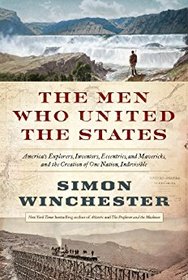Simon Winchester almost lost me on his pandering to Obama and his Leftist League. When the author talked about American history, and fascinating kernels of semi-lost historical facts, I really enjoyed this book. However, I will choose a clearly-labeled political tome when I want politics. I resented it that this author chose to give me his political views under the guise of 'historical fact.' By his own admission, he did not become an American until around 2012; I resent American politics being preached to me.
I continued this book because I'd enjoyed 'The Professor and the Madman.' I don't recall being preached to in that book. However, he took every opportunity to degenerate any policy he didn't approve of throughout our American history. There are other books in Winchester's backlist that I thought I'd read, but I'll pass because of his preachy tone in this book.
Journalists are taught not to be part of the story, however, Winchester constantly inserts himself in ways that are unattractive. I don't care that he bought a piece of property, sold it and someone else made a killing from the land's further sale. What does that have to do with "The Men Who United the States?"
This is a fairly long book (almost 700 pages) that includes interesting sections on transportation, via rail, water, and air. He includes fascinating characters (Clarence King and De Witt Clinton, to name two) that I probably would have never heard of except through these pages. However, the book is too long, too comprehensive, too much. By the end, I was just relieved to be finished.
I continued this book because I'd enjoyed 'The Professor and the Madman.' I don't recall being preached to in that book. However, he took every opportunity to degenerate any policy he didn't approve of throughout our American history. There are other books in Winchester's backlist that I thought I'd read, but I'll pass because of his preachy tone in this book.
Journalists are taught not to be part of the story, however, Winchester constantly inserts himself in ways that are unattractive. I don't care that he bought a piece of property, sold it and someone else made a killing from the land's further sale. What does that have to do with "The Men Who United the States?"
This is a fairly long book (almost 700 pages) that includes interesting sections on transportation, via rail, water, and air. He includes fascinating characters (Clarence King and De Witt Clinton, to name two) that I probably would have never heard of except through these pages. However, the book is too long, too comprehensive, too much. By the end, I was just relieved to be finished.




